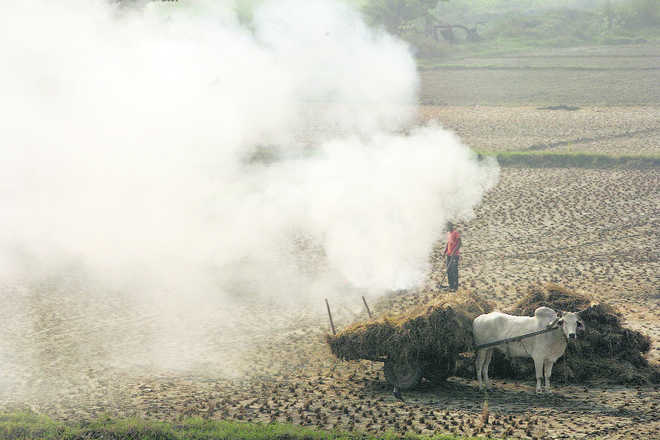
RAJEEV JAYASWAL
Cereal crop residue burning is quite common in India. It takes place in almost every state. Its intensity may, however, differ from place to place. The debate of stubble burning is often linked to the northwest region, particularly to Punjab and Haryana because smoke from their fields apparently aggravates already polluted air of the elite National Capital Territory of Delhi. UP, which is the largest producer of crop residue and also the biggest culprit of stubble burning, often escapes the blame for polluting Delhi, thanks to the wind direction. Perhaps, that could be the reason for Banaras taking over Delhi as the most polluted city recently, barely nine notches away from the level of 'public health emergency'. Industrial and vehicular emissions are the real culprit, incessantly polluting the National Capital Region.
The myth
It is also a myth that stubble burning is an issue of one particular region. This disastrous practice has already gripped the entire nation including Maharashtra, West Bengal, Karnataka, Andhra Pradesh, Tamil Nadu, Gujarat, Orissa and Rajasthan. Therefore, it is a national problem that needs full involvement of the Centre along with its technical resources and financial muscle.
The reality
Undoubtedly, the problem of stubble burning is intense in Punjab, Haryana and Western UP because cultivators of this region are engaged in intensive farming. They normally grow two crops every year, but some enterprising farmer get three crops from the same land.
Farmers have to harvest rice quickly to sow wheat in a gap of just 10-15 days - between October end and November 15. Machines help them in quick harvesting but leave long and finely honed stubbles, sharp enough to hurt animals as their fodder. Compared to wheat straw, paddy residue is not a preferred animal feed because of high silica content. In some states, where fodder is scarce, farmers spray alkali to make it digestible for animals. In this region, wheat straw is used as animal fodder.
It is, however, surprising that some farmers have also started burning wheat residue. This usually happens in April-May, months before the sowing season for monsoon crops. Reasons include the negative return on investment due to high cost of labour, thanks to the Mahatma Gandhi National Rural Employment Guarantee Act (MGNREGA). Usual incentive is an additional income through a third crop, mainly potatoes, which is grown after paddy harvest and before wheat cultivation. Farmers find a matchstick as a quick and easy option that saves time and labour cost.
Persuasion vs. penalty
Meanwhile, several aware farmers, particularly in Punjab, have completely abandoned stubble burning. Some discontinue it because of its adverse impact on soil health and some preferred to follow the law. As a result, there has been 45% drop in stubble burning cases in Punjab this year. Haryana acted tough and booked more than 1,000 farmers for stubble burning. Persuasion is, however, everlasting in a democracy than penalty especially when the government has vowed to double the farmer's income in next five years.
Politics above projects
Days before the Punjab election, the BJP-led Central government had promised to set up a bio-refinery at Bathinda to salvage local farmers from stubble burning. The foundation stone laying ceremony for the project was held on December 25, 2016. According to government and industry officials, the project lost the steam after Akali-BJP coalition government was ousted from the power in February. The Petroleum Ministry has, however, reiterated its commitment to set up the project in an email reply to The Tribune. The "work is in progress”, it said without providing detailed progress report or the date of its commissioning.
Other non-governmental efforts to find viable alternative of stubble burning often get trapped into the Centre-state discord and bureaucratic indifference. According to a recent report by The Tribune, Prof Robert Berry of Aston University along with IIT Ropar had initiated a pilot project to make fuel pellets from straw in three villages, but they had to abandon it after the Petroleum Ministry told them that they could not produce or sell fuel without its permission. Fuel pellets could have been used in heating, cooling or meeting other energy needs of the local community.
Lungs in Tandoor
Can you give up eating your favourite tandoori tikka or burra kebab? Coal used in tandoors to cook these delicacies are harmful for your lungs and there are some 9,000 hotels and restaurants in Delhi alone.
Killer nozzles
Do you know that swanky petrol pumps are silently polluting your air? Ideally, all petrol pumps should install vapour recovery system to reduce emission of volatile organic compounds (VOCs) both, at the time of dispensing fuel and also at the time of filling of storage tanks.
.jpg)



























